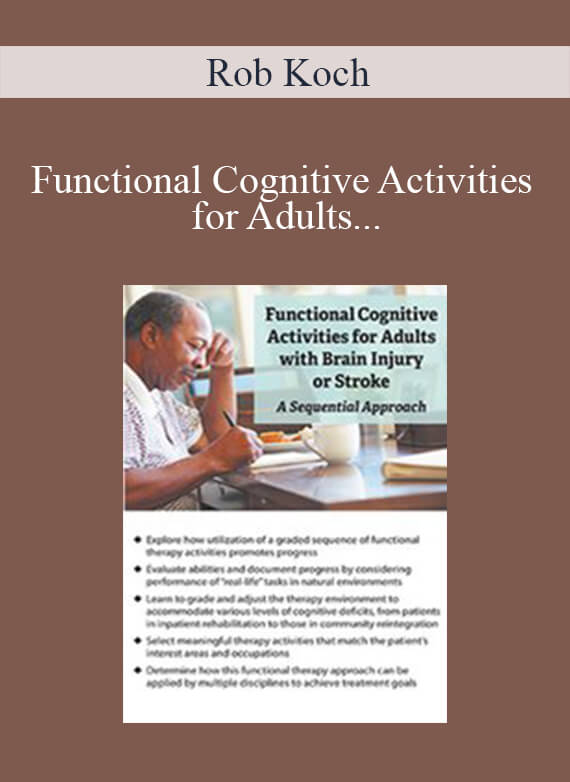[Download Now] Functional Cognitive Activities for Adults with Brain Injury or Stroke – Rob Koch
$199.00 Original price was: $199.00.$50.00Current price is: $50.00.
[Download Now] Functional Cognitive Activities for Adults with Brain Injury or Stroke – Rob Koch
Product Delivery: You will receive a download link via your order email immediately
Should you have any question, do not hesitate to contact us: [email protected]
[Download Now] Functional Cognitive Activities for Adults with Brain Injury or Stroke – Rob Koch
Sale page_https://catalog.pesi.com/item/34253/
Archive: https://archive.fo/EA3rk
Typical therapy approaches used for rehabilitation of adults with cognitive deficits due to brain injury or stroke target primary cognitive sub-skills (memory, orientation, attention, etc.) in isolation. Therapy methods normally include tabletop activities, computer training, and pencil/paper tasks to improve underlying cognitive impairment. However, the learning associated with these methods does not always translate to the world outside the clinic. Patients may become frustrated with their lack of progress or find themselves unable to perform necessary tasks once they return to their home environment.
This recording introduces an innovative, alternative, and effective approach to TBI and stroke rehabilitation. It proposes that therapists dealing with cognitive deficits conduct therapy sessions that steer away from work on primary cognitive skills in isolation and switch to having the patient perform comprehensive activities in “real-life” environments. This is accomplished by utilization of a graded sequence of functional therapy activities. The main concept behind this approach is that three global factors influence the patient’s “real-life” functioning. These factors include the awareness and management of interpersonal relationships, the environment, and time constraints.
Therefore, therapy activities in this sequence have been structured to interweave the three global factors so that the patient interacts dynamically with other people, physical space, and time parameters during sessions. As the patient improves, expectations for sessions change as environmental demands increase and tasks become more complex. The levels of the sequence pertain to patients ranging from inpatient rehabilitation to those in community reintegration.Gain a better understanding of how patients’ successes in cognitive rehabilitation require a multidisciplinary effort, as well as an emphasis on “real-life” activities, to achieve maximum independence.
- Examine a sequence of functional therapy activities to use with adults with cognitive deficits due to brain injury and stroke
- Plan therapy sessions that emphasize real-life tasks and move away from tabletop activities
- Select meaningful therapy activities that match the patient’s interest areas and occupations
- Evaluate abilities and document progress by considering performance of real-life tasks in natural environments
- Assess how to grade and adjust the therapy environment to accommodate various levels of cognitive deficits
- Develop realistic caregiver instructions that support the rehabilitative process in the home
- Discover how this therapy approach can be applied by multiple disciplines to promote progress
DEVELOPMENT OF THE APPROACH
- The foundation of this approach
- What is functional activity?
- The three global elements of “real-life” activity
- interpersonal awareness and management
- environmental awareness and management
- time awareness and management
MODELS OF INTERVENTION FOR COGNITIVE REHABILITATION
- Remedial vs. compensatory vs. combination approaches
- Multidisciplinary implications
- coordinating the effort to increase patient’s independence
FUNCTIONAL COGNITIVE EVALUATION
- Establishing levels
- Low-level tasks
- Mid-level tasks
- High-level tasks
- Awareness and emotion
SETTING GOALS AND MEASURING PROGRESS
- Progress checklists
- Functional goal setting
ACTIVITY DESIGN, SETUP AND IMPLEMENTATION
- Preparing for sessions in advance
- Ready-made materials
- Grading the environment
- Relevance to patient’s interests and occupations
- Applications for the teenage population
CAREGIVER SUGGESTIONS
- Follow through in the home
- Ideas for community reintegration
OVERVIEW OF THE EIGHT ACTIVITY LEVELS
- Level 1: Initiating the Next Step
- Level 2: What Time is It?
- Level 3: Looking Around
- Level 4: Follow a Time Schedule
- Level 5: Beyond the Room
- Level 6: Organize the Therapy Session
- Level 7: Out the Door
- Level 8: Planning/Multitasking
DETAILED DISCUSSION OF EACH OF THE EIGHT ACTIVITY LEVELS ABOVE
- Specific activities at each level
- Contrast characteristics of activities between levels
- Case examples
- Time awareness and management factors
- Environmental awareness and management factors
- Interpersonal awareness and interaction factors
Tag: Functional Cognitive Activities for Adults with Brain Injury or Stroke – Rob Koch Review. Functional Cognitive Activities for Adults with Brain Injury or Stroke – Rob Koch download. Functional Cognitive Activities for Adults with Brain Injury or Stroke – Rob Koch discount.
Delivery Method
– After your purchase, you’ll see a View your orders link which goes to the Downloads page. Here, you can download all the files associated with your order.
– Downloads are available once your payment is confirmed, we’ll also send you a download notification email separate from any transaction notification emails you receive from IMC.sale.
– Since it is a digital copy, our suggestion is to download and save it to your hard drive. In case the link is broken for any reason, please contact us and we will resend the new download link.
– If you cannot find the download link, please don’t worry about that. We will update and notify you as soon as possible at 8:00 AM – 8:00 PM (UTC+8).
Thank You For Shopping With Us!

![[Download Now] Functional Taping Applications for Geriatrics & Stroke Patients - Milica McDowell](https://imc.sale/wp-content/uploads/2022/02/Functional-Taping-Applications-for-Geriatrics-Stroke-Patients-–-Milica-McDowell-100x100.jpg)
![[Download Now] Fall Prevention Challenges: Real Solutions to Reduce Falls](https://imc.sale/wp-content/uploads/2022/02/Fall-Prevention-Challenges-Real-Solutions-to-Reduce-Falls-Prevent-Injuries-and-Limit-Liability-–-M.-Catherine-Wollman-100x100.jpg)
![[Download Now] Functional Cognitive Activities for Adults with Brain Injury or Stroke – Rob Koch](https://imc.sale/wp-content/uploads/2022/02/Functional-Cognitive-Activities-for-Adults-with-Brain-Injury-or-Stroke-–-Rob-Koch.jpg)

![[Download Now] Functional Cognitive Activities for Adults with Brain Injury or Stroke – Rob Koch](https://imc.sale/wp-content/uploads/2022/02/Functional-Cognitive-Activities-for-Adults-with-Brain-Injury-or-Stroke-–-Rob-Koch-100x100.jpg)
6 reviews for [Download Now] Functional Cognitive Activities for Adults with Brain Injury or Stroke – Rob Koch
There are no reviews yet.